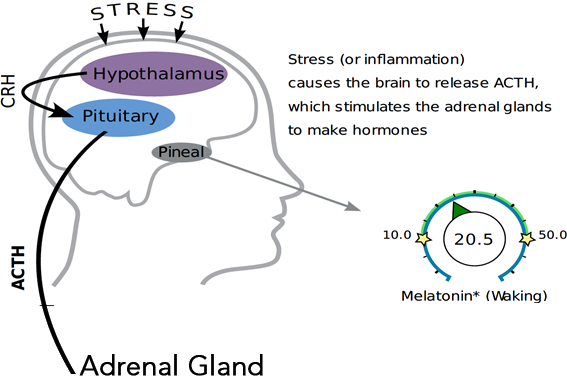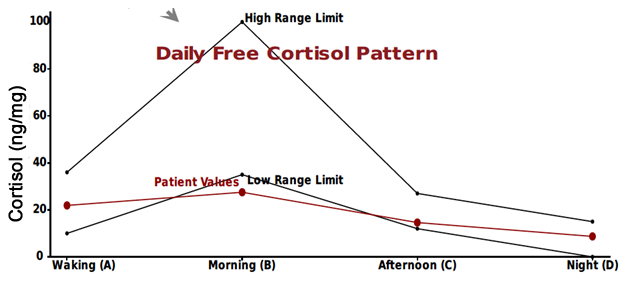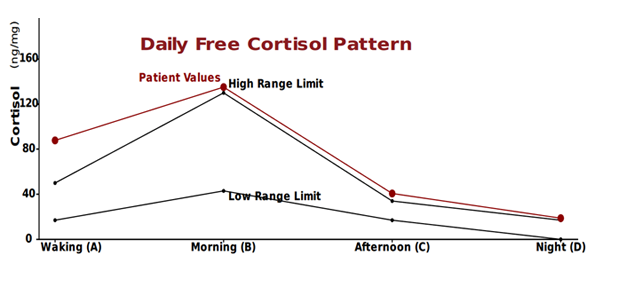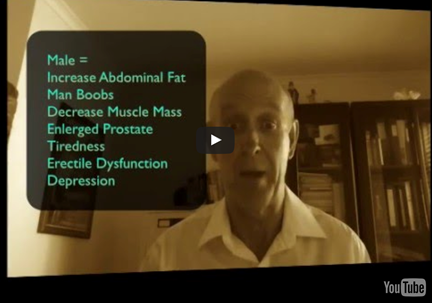“Can Stress Cause Fatigue?”
You wake up late on a day when you have an early morning meeting.
You jump out of bed; race to get ready and run out of the door.
You begin to relax as you drive down the street because you still have time to make your meeting.
As you merge onto the highway you see a wall of traffic in front of you.
You realize with a sinking feeling that you’re going to be late after all.
You probably got stressed out, tired or fatigued just reading that.
Most of us are used to dealing with stress intermittently throughout the day.
Stress from work, family, and or money problems is par for the course; however it can adversely affect our health if we don’t manage it correctly. TIREDNESS AND FATIGUE CAN RESULT.

Stress is very insidious because it chips away at your wellbeing little by little.
It comes and goes but residual effects remain.
Excessive stress can also lead to fatigue, because our body becomes overwhelmed dealing with the hormones and physiological response of stress.
For two years in a row, the annual stress survey commissioned by the American Psychological Association has found that about 25% of Americans are experiencing high levels of stress (rating their stress level as 8 or more on a 10-point scale), while another 50% report moderate levels of stress (a score of 4 to 7) 1
Stress Response
Certain symptoms of stress are very common.
We may get sweaty palms, increased heart rate, and dry mouth to name a few. But what’s actually happening in our body when we’re in a stressful situation?
For those who would like to know more about the stress response
Our body’s response to stress can be characterized as short term or long term:
- Short term responses – Produced by The Fight or Flight Response via the Sympathomedullary Pathway (SAM)
- Long term stress – Regulated by the Hypothalamic Pituitary-Adrenal (HPA) system. 2
Short term stress is generally manageable, but long term stress should be carefully monitored. In order to understand how long term stress causes fatigue let’s talk about the HPA (Hypothalamic Pituitary-Adrenal) System.
The Hypothalamic Pituitary-Adrenal (HPA) System
When your body responds to stress your HPA system is activated. The hypothalamus, which is located in the brain, sends a message to the pituitary gland that secretes adrenocorticotropic hormone (ACTH).

Next, the ACTH stimulates the adrenal glands; there are two of them and they’re located above the kidneys. The adrenals release cortisol to prepare your body for ‘fight or flight’.
This is referred to as the cortisol stress response.
The immune system is suppressed the entire time this happens.
This is why too much stress over an extended period of time will give your HPA system a run for its money, and it’s the reason that adrenal fatigue and stress are closely related.
Issues with the HPA System
When you’re under a prolonged state of stress (hyperarousal), over time, your adrenal glands can become overwhelmed.
Your brain sends the message and your adrenal glands fail to react and can cause Adrenal Fatigue.
Your body needs those hormones to recover, so when they aren’t available fatigue comes into play.
As time goes on you feel more and more lethargic.
Symptoms of Adrenal fatigue are:
- Muscle weakness and back pain
- Recurrent infections
- Dizziness
- Salt cravings
- Memory problems
Stress and Insomnia
When your mind is racing with stressful thoughts it can be particularly difficult to fall asleep at night because stress affects the Pineal Gland (See picture above) and Melatonin (the sleep hormone is reduced) and insomnia is the consequence.
From the picture above I know the Melatonin levels are within normal range for this patient because we tested the Melatonin levels.
Therefore I know that Melatonin deficiency is not the cause of this patient’s insomnia.
However the Adrenal hormones were unfortunately not within the normal reference ranges therefore causing significant stress responses and therefore possibly insomnia.
The red line represents the patient’s values (See Picture below. . . ) and you can see this patient wakes up with energy but during the day cortisol levels are very low possibly giving rise to tiredness or fatigue especially from 10am to late afternoon and then her energy returns.
This picture represents adrenal fatigue . . .

However in some instances stress can cause hyperarousal, which upsets the balance between sleep and wakefulness. 3
Although hyperarousal is commonly linked to post traumatic stress disorder, the symptoms can be experienced on their own.
Hyperarousal is defined as a state of increased psychological and physiological tension, also referred to as a chronic state of fight or flight.
Some of the symptoms of hyperarousal are:
- Insomnia
- Nightmares
- Constant feeling of being in danger
- Aggression
From the picture below I know that this person wakes stressed and is in hyperarousal all day (See red line – patient values).

And because of this high cortisol levels it can also cause Insomnia.
One study showed that insomniacs with the most sleep disturbance also had the highest amount of cortisol being released in the evening and nighttime hours. 4
Lying awake night after night would stress anyone out, and the ongoing sleepless nights will lead to serious fatigue over time.
 If you would like to find out more about these hormonal responses and you like watching video’s please go here to find out more. Go half way down the page where you’ll see an interesting weird pic of myself that looks like this . . .
If you would like to find out more about these hormonal responses and you like watching video’s please go here to find out more. Go half way down the page where you’ll see an interesting weird pic of myself that looks like this . . .
You’ll need a nice place to relax, close the door because this 28 minute video presentation will explore stress, hormones and health.
So what can you do to alleviate issues related to stress and fatigue?
We have some great suggestions ahead!
Natural Treatment for Adrenal Fatigue
Those adrenals are really important for your body’s overall function so it’s important to take good care of them. You can do this in the following ways:
Diet – Eliminate foods that cause inflammation and sensitivity such as:
- Refined carbohydrates such as white rice and sugar
- Fruit juices
- Caffeine
Include the following foods:
- Eggs
- Free range chicken – high protein
- Avocado
- Leafy greens and vegetables
Try these supercharged nutrients or supplements for adrenal fatigue:
- Co Enzyme Q10
- Vitamin B5, B6, Energy and cell metabolism
- Vitamin B12 gives an –
- Immediate energy boost
- Better concentration and mental focus
- Reduced stress and irritability
- Clear thinking; eliminates “brain fog”
- It must be activated though – not any B12 will do – this is important.
- Vitamin C – This vitamin is involved in cortisol production so it can help with adrenal recovery
- Magnesium – Assists with maintaining energy
- Omega 3 – reduces inflammation and eases the workload of your adrenals
Natural Insomnia Remedies
If stress has you lying awake at night tossing and turning, here are a few suggestions to get some zzzzz’s:
- Aromatherapy – Lavender is the go to scent for relaxation. You can try spaying it on your pillow or find a lavender filled pillow. 5
- Valerian – This supplement is one of the most common treatments for insomnia. It improves deep sleep and the speed of falling asleep. It’s effective when used over an extended period of time.
Managing Stress Naturally

Meditation Relieves Stress . . .Since stress is the root cause of these issues, it only makes sense to explore natural ways to manage stress: 6
- Exercise – Natures antidepressant will get those good hormones flowing and set you up for a great night’s sleep.
- Commune with Nature – Disconnecting from technology and spending a day in nature can be very soothing
- Deep breathing – Taking several deep breaths can have a direct impact on your nervous system and bring much needed relief in a moment of stress.
- Meditation – Setting aside a specific amount of time each day to be mindful and focus on your breathing will reduce your stress immensely overtime. Even 15 minutes can make the difference.
- Acupuncture – By inserting needles at certain areas of the body, the balance of energy can be restored.
Fatigue caused by stress is more common that you think.
Luckily there are many remedies available to get you back on track with your energy and stress levels, so that you can live your life to the fullest!
Also there are many remedies that are Practitioner ONLY products that work extremely well and can get you back feeling active and live once again.
Would You Like To Find Out More?
If you are a member of our clinic and interested in Regain Your Energy Now Program and you would like to know more about fatigue and how it’s related to stress, adrenal fatigue or cortisol levels, just let Wayne know at your next consultation.
[ls_button icon_right=”fa-home” color=”default” url=”/contact” target=”_self” ]Book An Appointment Todayt[/ls_button]
Yours in Health,

From the Team at Unique Health and Wellness
P.S. As mentioned earlier . . . Fatigue can be caused by stress and stress is also one of the common reasons for adrenal fatigue, high cortisol levels and insomnia. These conditions can be frustrating to deal with, however we are here to assist you with natural solutions that are proven to work for many clients.
P.P.S. I am pro-active about my health. I want to book now and I realise the consultation is normally valued at $300.00, however if I act now I will receive a substantial discount!
References:
- http://www.health.harvard.edu/staying-healthy/understanding-the-stress-response
- http://www.simplypsychology.org/stress-biology.html
- https://sleepfoundation.org/ask-the-expert/stress-and-insomnia
- http://articles.mercola.com/sites/articles/archive/2001/08/29/insomnia-part-one.aspx
- http://articles.mercola.com/sites/articles/archive/2009/01/06/8-natural-remedies-that-may-help-you-sleep.aspx
- http://articles.mercola.com/sites/articles/archive/2013/11/07/8-stress-management-tips.aspx
Disclaimer
The information provided does not take into account individual needs of any particular person. When providing this information it is intended as a sharing of knowledge and information from the research. The information provided should not be construed as personal medical advice or instruction and is not intended to replace a one-on-one relationship with a qualified health care professional and is not intended as medical advice. We encourage you to make your own health care decisions based upon your research and in partnership with a qualified health care professional.

MORE BLOG STORIES
Breaking Down the B Vitamins
Amazing Ways to Help Heal Mitochondrial Dysfunction!
The 5 Worst Foods For Your Gut
‘THE GOLDEN GODDESS’
Mitochondria, Inflammation and Oxidative Stress
Tired? You May Be Suffering From Mitochondrial Dysfunction